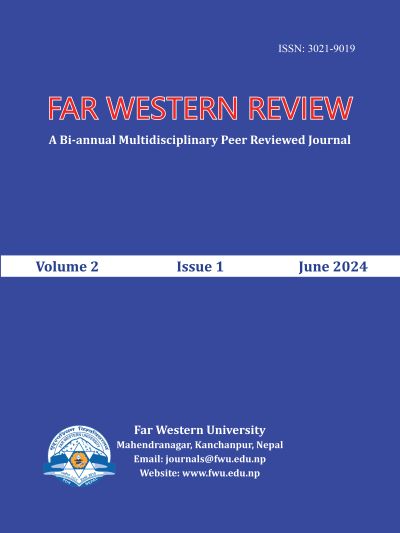Rifampicin-resistant Tuberculosis and Associated Factors Among Pulmonary Tuberculosis Patients in Mahakali Provincial Hospital, Nepal
DOI:
https://doi.org/10.3126/fwr.v2i1.70540Keywords:
Rifampicin resistance,, mycobacterium tuberculosis, GeneXpert MTB/RIF assay, pulmonary tuberculosis, drug-resistant tuberculosisAbstract
The study aims at assessing the prevalence of RR-TB and identify associated factors among pulmonary TB patients using GeneXpert MTB/RIF assay data from January to December 2023. Tuberculosis (TB) continues to pose a significant global health threat, with rifampicin-resistant (RR) strains presenting a formidable challenge to disease control efforts. This study based the retrospective cross-sectional study conducted at Mahakali Provincial Hospital in Nepal. Out of 2587 presumptive TB cases, 11.8% were confirmed positive for TB, with males constituting a significantly higher proportion (66.1%) than females (33.9%). Among TB-positive cases, 3% showed resistance to rifampicin, predominantly affecting males (77.8%). Age group analysis revealed higher TB detection rates in the 46-60 years group, while rifampin -resistance tuberculosis (RR-TB) cases were more evenly distributed across age groups without statistical significance. Ethnicity and residential locality did not show significant associations with RR-TB. Multivariate logistic regression highlighted gender as RR-TB and associated factors among pulmonary tuberculosis patients in a Mahakali Provincial Hospital, Nepal. Rifampicin-resistant TB (RR-TB) remains a significant challenge at Mahakali Provincial Hospital, with a 3% prevalence, predominantly affecting males. Gender is a key factor in RR-TB prevalence. To manage and reduce RR-TB effectively, it is necessary to implement targeted interventions for high-risk groups, particularly males, and to enhance diagnostic capabilities.
Downloads
Downloads
Published
How to Cite
Issue
Section
License

This work is licensed under a Creative Commons Attribution-NonCommercial 4.0 International License.
CC BY-NC: This license allows reusers to distribute, remix, adapt, and build upon the material in any medium or format for noncommercial purposes only, and only so long as attribution is given to the creator.




